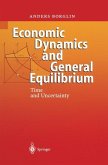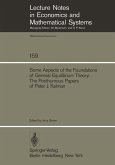This book is a substantially revised and enlarged version of the monograph General Equilibrium with Increasing Returns, published by Springer-Verlag as a Lecture Notes volume in 1996. It incorporates new topics and the most recent developments in the field. It also provides a more systematic analysis of the differences between production economies with and without convex production sets. Five out of twelve chapters are new, and most of the remaining ones have been reformulated. An outline of contents appears in chapter 1. As its predecessor, this book contains a formal and systematic exposition of the main results on the existence and efficiency of equilibrium, in production economies where production sets need not be convex. There is an explicit attempt at making of it a suitable reference both for graduate students and researchers interested in theory (not necessarily specialists in mathematical economics). With this twofold purpose in mind, the work has been written according to three key principles: (i) To provide a uhified approach to the problems involved. For that we construct a basic model that is rich enough to encompass the different models appearing throughout, and to derive all the results as coroilaries of a reduced number of general theorems. (ii) To maintain a relatively low mathematical complexity. Thus, when the estimated cost of generality exceeds the benefit of simplicity, we shall state and prove the theorems under assumptions that need not be the most general ones.








